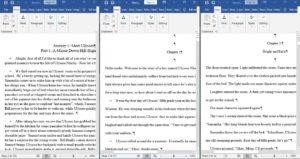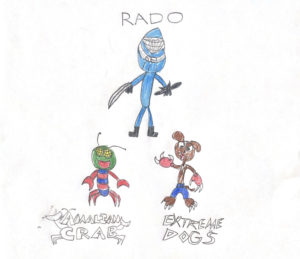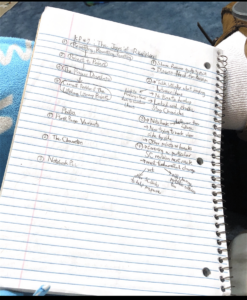Welcome to the cKotch.Com blog. I’m Christopher Kotcher, and this is Kotcher’s Pen. Time to delve into my writing’s inner workings.

Rewriting, Rewriting, Rewriting
“Good writing is rewriting, rewriting, rewriting.”
That would be one of the most influential lessons learned in my college years. I learned it from one of the best professors in my university’s Campus Honors Program.
Revision is key to good writing. Believe it or not, most writers’ first drafts tend to be lousy. In fact, they’re usually meaningless noise desperately fighting to fill a blank page.
You see, we writers hold lofty ideas in our heads. How could we ever be expected to perfectly communicate these thoughts in the written word? Let alone on a first try.
Yes, writing is a trying passion. Most necessary part of the process is often ransacking precious drafts, tearing out beloved scenes that don’t work.
Nothing pains writers more than having to remove that one insight, quote, or paragraph you once believed would touch the hearts of millions.
Now, I’ve sounded pretty dismal so far. Haven’t I?
Well, this post is actually a positive one. In fact, it may be one of the most positive posts I’ve ever written.
You see, revision can be a soul-crushing process, but it is ultimately a joyful one. Revision allows writers to bring our works closer to the grand visions we first see in our heads.
Quite literally, revision is about creating a new vision of the ideas in your head. You look at your previous vision and make a version which better matches your thoughts.
Here I’m going to discuss how I came across my current revision process. It will be somewhat similar to my discussions of crafting dialogue and finding focus.
As always, I want to show what has worked for me. I want it to inspire you, whether you be a fellow writer, another kind of hobbyist, or someone who can apply my writing experience to your life.
Project to Project
We begin in a time before I saw the need for revision.
In my earliest writing days, I bounced between projects. I’d churn out twenty to thirty pages, call it a book, and move onto the next masterpiece.
I didn’t give much thought to my writing. I had far too many ideas that needed to get onto the page. I couldn’t afford to lose a single one.
First, there was The Lost Puffin. That thing was pure insanity, which you can read about in this post here.
Then there was Rado Vs. The Slayer Bot, a grand post-apocalyptic tale. There was a hero with a sword arm. He fought evil crocodile robots who had stolen plans for an even deadlier robot.
From there, I raced to write Amalian Crab, a tasteful tale of animal-like aliens. The title character there became wrapped up in an evasion of eye aliens called Eyelos.
After that, I won a notebook in a school raffle and started writing Story Chronicles. I rushed through as many stories as I could and made my parents read every one.
My dad told me that was a good first draft. The comment stung.
This was my magnum opus here. These chapters barely a paragraph long without any real dialogue were going to win over the masses.
Finally, I started on my project Extreme Dogs. Aliens would come to Earth and mutate dogs into a hyper intelligent army to try taking down humanity.
Quite the whirlwind tour, huh?

Like I said, I had many ideas that needed to get onto the page. Soon as I wrote “The End” on one project, I would bounce to the next. Nothing could be lost.
Of course, in rushing these projects, I was actually losing everything. No project received the time it deserved. Nothing could approach the grand visions in my head. They never came close.
I was halfway through Extreme Dogs. Second thoughts started seeping in. Maybe they had something to do with my dad’s comment. Maybe they were something I knew all along.
I wasn’t making masterpieces. I was barely even making first drafts. These early pieces were glorified outlines at best.
I wanted to do better. I needed to choose one project and take the next step forward with it. If you’ve been following this blog, that choice should be obvious.
It was my lifelong literary project, Story Chronicles.
The Process Develops
My first major revision project focused on Story Chronicles. I was in high school, and I would sit at the computer to type whenever I could.
At this time, I took plans for eight small books and tried to make one massive, jam-packed novel about them. All in all, that behemoth would have had sixty-four chapters.
Using the computer alone really was the simplest method back then. I would print out the small pseudo-first drafts I had from years before. They were good references for my ideas.
All I had to do was glance at prior ideas, reconsider them for a moment, and type away.
When that draft finished, I took breaks for other ideas here and there. One was the story of a hero trying to live in a world he’d already saved. Another focused on a gatekeeper to an evil citadel.
Soon enough, I returned to Story Chronicles. I wrote three sequels so I could get an idea where I wanted things to go before returning again to the initial book.
Thing is, I began to hit a standstill here.
I was used to printing off prior drafts to use as references. That worked well when there wasn’t much to print. However, I now had drafts spanning over a hundred pages.
That was too much paper to handle.
Still, I needed some way to reference prior revisions during my writing. At this point, I looked to what I was doing in school.
College had started, and being an English major in a Campus Honors Program, I constantly had to write. Everything had to be typed, but I didn’t always have a computer around me on days with lengthy waits between classes.
I had begun drafting all my essays in the notebooks for my courses. It was an easy way to get writing before sitting myself in front of a computer and cranking out a final draft.
That soon became the approach for my personal writing projects too.

I would buy notebooks specifically for the purposes of revision. I’d sit down at the computer, reference an old version of a story, and write down my new vision of the grand ideas.
Once a section would be written out, I’d sit back down at the computer and type everything I’d written.
The process was an interesting one to say the least. It wasn’t necessarily time efficient, but it gave a good sense of accomplishment going through it.
Typing the written draft could often prove mundane. So, I’d start listening to videos or music during that part of the process.
Recently, I’ve tried moving away from the notebook phase to conserve time. Viewing windows side by side has been helpful in this endeavor.
Of course, the old habits are hard to break, even in the quest for more efficiency.
The Joy of the Thing
When I began writing, none of my words could ever create the worlds I wanted to make. My style could never capture the themes I wanted to convey.
To all who wish to create something, don’t be discouraged that your first attempt doesn’t match what you wanted to make. Years passed before any of my projects became anything worthwhile.
By writing, I improved my skills as a writer. I pushed forward, even as my stories came out half-baked. Ability came over time with passion as its guide.
I could’ve kept jumping between projects. I could’ve kept moving onto my next big idea.
However, I feel called to go back to where I started. Revision allows me to use my newly developed skills to refine the old pieces and truly see how I’ve improved.
The process also brings a good sense of humility. Revision ensures I don’t forget where I started as a writer of a particular piece. I properly understand my strengths and weaknesses and how they develop over time.
Revision just invites self-reflection, and healthy self-reflection grants opportunities for joy and appreciation.
Over time, my revisionary process has mostly focused on Story Chronicles. That’s the reason I always call it my lifelong literary project.
Honestly, I know I’ve already self-published other books on Amazon, but I often feel as if my life as a writer doesn’t really begin until Story Chronicles is ready to go.
Maybe it’s time to start sharing details about the lifelong literary project’s current revision.
Let’s discuss that next week. Shall we?
Discussion Time!
Do you see the need for revision? What do you think of my revision processes? Any tips?
Kotcher’s Call to Action
If you like my content and wish to see more, you could check out my books Five Strange Stories and Good Stuff: 50 Poems from Youth on Amazon. They are enrolled in the Kindle Matchbook program, so anyone who buys the paperbacks can also get the eBooks for free.
Finally, be sure to like my Facebook page and share it with your friends. I post a link there whenever a new blog post goes live each Friday at 5:00 PM EST.
2 thoughts on “Kotcher’s Pen #2: The Joys of Revision”